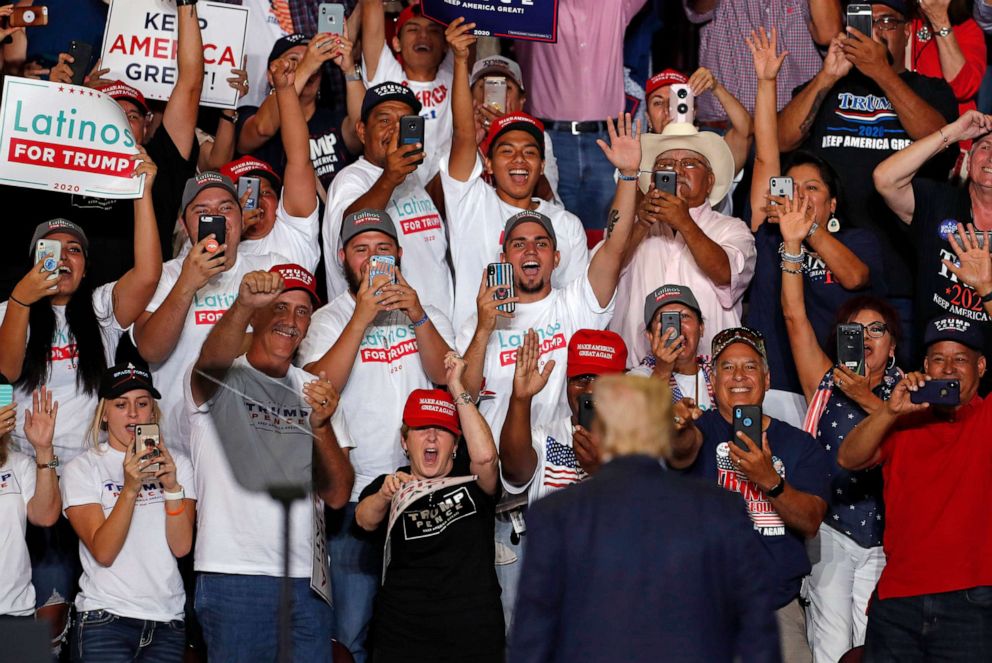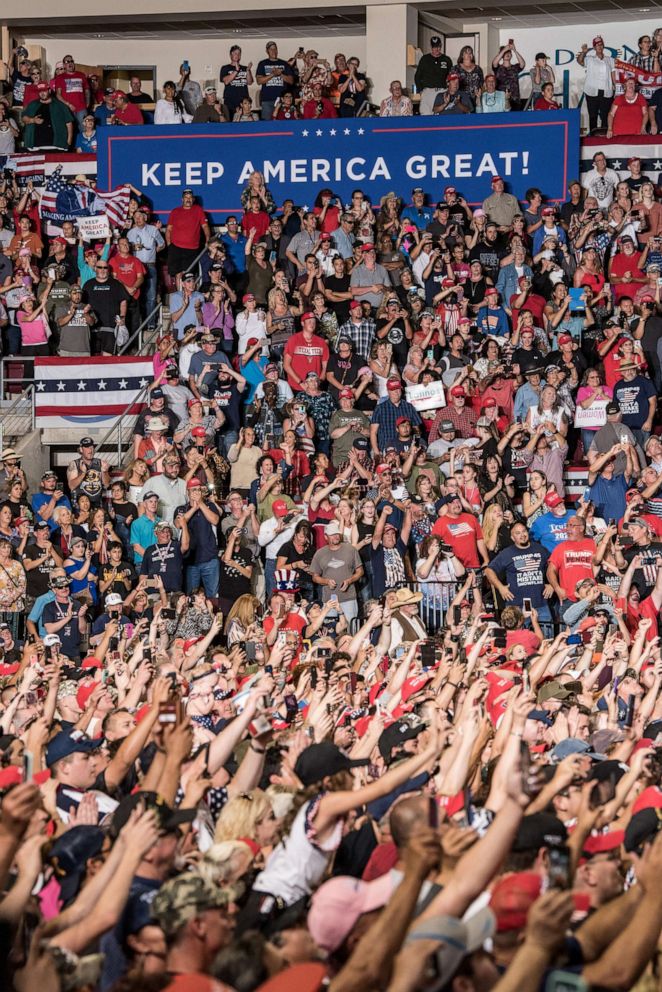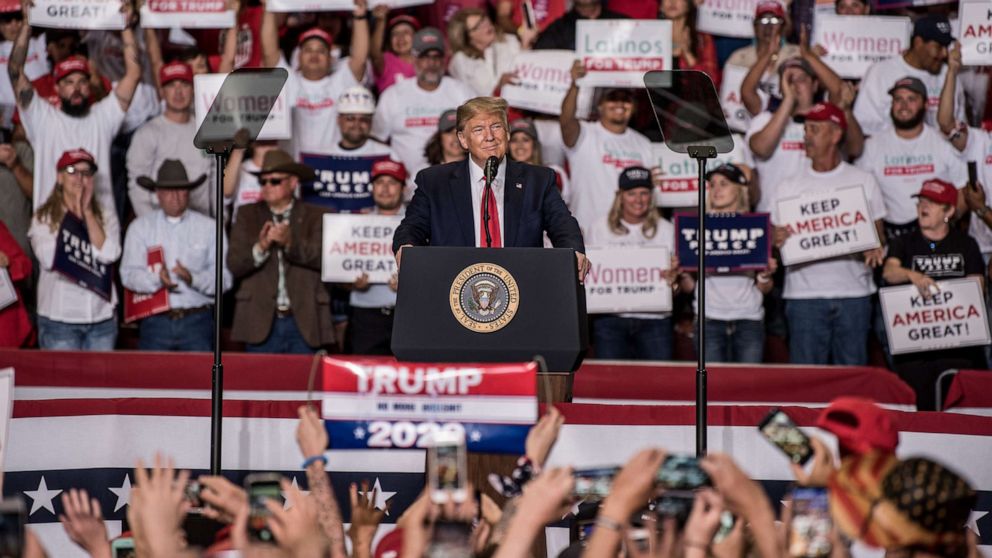Trump delivers 'false choice' for Latinos between country, racial identity: Experts
President Donald Trump sought to woo Latino voters during a campaign swing through New Mexico Monday evening, touting his electoral appeal with that key voting demographic in the 2020 presidential election, while invoking language that sparked criticism for drawing divisions between nationality and ethnicity.
While introducing Hispanic Advisory Council member Steve Cortes -- who also works as a CNN commentator and was a Wall Street trader -- Trump asked him to choose between Hispanics or the country.
Trump, shouting at Cortes, asked, "Who do you like more, the country or the Hispanics?"
"He says, the country," the president said.
Trump also said of Cortes, "He happens to be Hispanic, but I have never quite figured it out because he looks more like a WASP (White Anglo-Saxon Protestant) than I do."
While the GOP has remained mostly silent, the awkward scene before his spirited base prompted flak from those who saw the comments as offensive, including Republican presidential primary challenger Joe Walsh, as well as Democratic contender Julián Castro.

One Republican political consultant and outspoken Trump critic, Mike Madrid, called the remarks "troubling," since Trump made "a caricature of what a Hispanic 'looks like'" and drew "a distinction between Hispanics and true Americans."
Trump suggested that "Cortes must choose his true allegiance. Hispanics are demonstrably second-class citizens in the eyes of this president. These are both textbook definitions of racism," Madrid said.
The terms Hispanic and Latino both cover a wide range of people with multi-national origins, across different geographic regions and among a broad number of dialects. Several official U.S. government documents acknowledge the difference, separating out a question of race from a question of Hispanic/non-Hispanic, including on census forms.
Cortes defended the president on Twitter, saying that Trump used "awkward phrasing" but was trying to point out how much Cortes loves both the country and Hispanics, and "joking" that he couldn't tell which he loves more.
The Trump campaign did not immediately respond to ABC News' request for comment.
At the rally, Trump attempted to thread overtures to the Hispanic community throughout his speech, arguing that he has "the best numbers" across the board -- but particularly among Hispanic Americans despite his anti-immigrant agenda.
"They understand they do not want criminals coming across the border," he claimed. "They do not want people taking their jobs. They want to have that security. They want the wall. They want the wall."
Trump even said his administration is "working night and day to deliver a future of limitless opportunities for our nation's Hispanic American citizens, including millions and millions of extraordinary Mexican-Americans who enrich our society, and strengthen our country, serve in our military and contribute immensely to other shared American family."
In a recent ABC News/Washington Post poll, Trump's approval rating among Hispanics stood at 25%, far below the 50% approval among whites.
Trump's comments resonate with a sharply narrow audience -- even as he gears up for a tough re-election fight against a Democratic field eager to take his place -- political experts said.
In this particular instance, he offered a "false choice" to Hispanics, according to Melissa Michelson, a political scientist at Menlo College in California and former president of the Latino caucus of the American Political Science Association.
"A vast majority of Latinos in the United States have strong identities both as Americans, and as Latinos or as Hispanics," she said, arguing that the president's "double-meaning message" was for both his core white supporters, with racial undertones that he has been "peddling since 2015," and for a minority group of Latinos who likely voted for him in 2016.
For his white supporters, Michelson said Trump delivered "the same message as always, which is that the loyalty to America of people of color is questionable. Latinos are perpetual foreigners and therefore, perpetual potential enemies."
"It's an anti-immigrant, anti-Latino message, implying that folks who are Latino are not as loyal or are not as loyal or not as proud to be Americans as white people," she continued.
The second, she said, is for a "minority group of the Latino population ... who do value loyalty and patriotism to the United States and their identity as Americans more highly."
His message is for those who are "predisposed" to supporting Trump, who are seeking to confirm their Republican identity, Michelson told ABC News.
"What they're saying is they don't want to be considered Hispanic, they don't want to be considered Latinos, they just want to be considered American," she said, adding that they seek to disassociate themselves from an "undesirable segment" of Latinos.
Matt Barreto, a political science professor at UCLA and the co-founder of Latino Decisions, sees Trump's comments as being predicated on an effort to evoke "racial anxiety" solely among his white supporters. He also told ABC News that he thinks the Trump campaign's strategy could still be politically effective for a very specific Latino sect.
"I think they have a plan to try and win over Cubans and South Americans in (South) Florida," he said. "Rick Scott did a reasonable job in his Senate run against (Bill) Nelson. He sort of did better than the typical Republican in winning over some of those ... Outside of that, I do not believe he is going to make any inroads at all with Latino voters, and I don't think he's going to try."
"I think that their strategy is to use Latinos, and now it seems that it's not just immigrants," said Barreto. "It's a sort of racialization and antagonization of Latinos in general that appears to be part of their strategy."
This is also not the first time the president appeared to be creating a dividing line between national and ethnic identity -- particularly with the Hispanic population.

Trump began his presidential bid in 2015 by accusing Mexico of sending "rapists" across the border, he attacked an Indiana-born judge as being "biased" in a lawsuit against the president because he was "Mexican," and he closed out the 2018 midterm elections by stoking fear of a "caravan" of migrants on the stump.
At Monday's rally in New Mexico, a border state Trump lost in 2016 by eight percentage points and that houses the highest percentage of Hispanics as a population in the country, Trump refuted the frequent criticism that his rhetoric and policies inflame racial tensions across the country.
"They went to race," he said of his opponents. "Do you believe that one, race? I am the least racist person in this room."
Barreto contended that Trump's language on Monday is "further racializing Latinos" and feeds into a "long trope" about "good" versus "bad" immigrants.
"This feeds into the other comment about picking between racial ethnicity and if you're American," he said. "[It's] the hard working, light-skinned business owner is the good immigrant and the farm workers who pick all the food that we eat, and the construction workers who build all of the houses, those are sort of like the poor, bad immigrants."
"He is then sending a signal to his supporters, he's reminding them what Hispanics look like," he continued.
Barreto also thinks it might continue Republicans' downward trend with the Latino vote, even as Hispanics are poised to comprise the largest racial or ethnic minority group in the electorate for the first time in 2020, according to the Pew Research Center.
"This is the prime reason that Texas went from 16-point margin for (Mitt) Romney to only a nine-point margin for Trump. He lost seven points in Texas, which was almost entirely in the Rio Grande Valley," he said, describing a majority Hispanic area. "It was like the worst presidential run that Republicans ever had."
As Trump attempts the same strategy on the campaign trail in 2020 as he did in 2016, Barreto noted that this cycle comes after public outrage over the administration's "zero-tolerance" policy that led to family separations and children being held in cages.
"He overplayed his hand," Barreto said. "He didn't build a wall. He didn't stop any of these things."
ABC News' Will Steakin contributed to this report.




